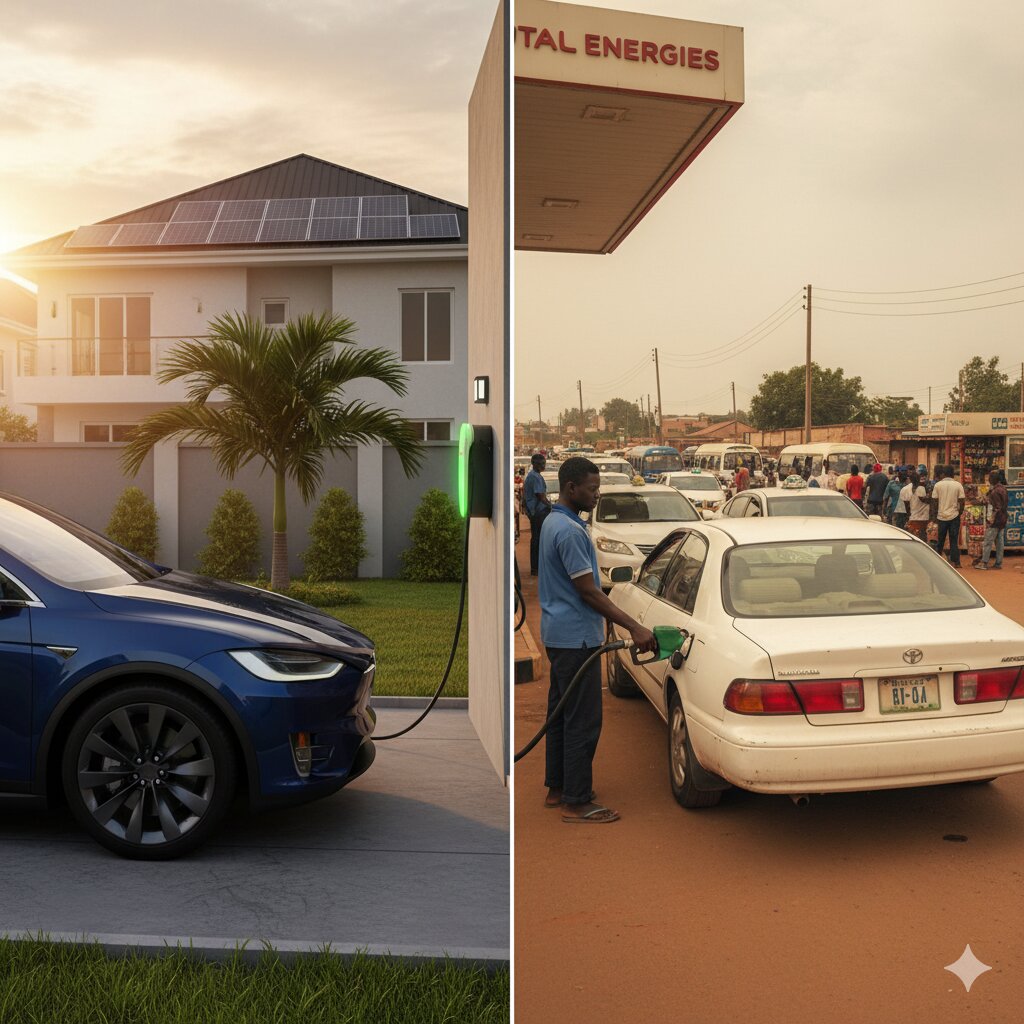
Picture this: It’s 8 a.m. on the Third Mainland Bridge. Lagos traffic is doing what Lagos traffic does best—choke. Your petrol car’s AC is on full blast, the fuel gauge is diving like the naira against the dollar, and that ₦35,000 half-tank from last night? Already halfway gone.
Meanwhile, the radio says PMS prices are hovering around ₦850 per litre—again. Between endless queues at filling stations and rising costs, it’s no surprise many Nigerians are starting to look at electric vehicles (EVs) not just as fancy tech toys but as genuine escape routes from fuel wahala.
But let’s be real—nobody is buying a car in Nigeria just to save the planet. We buy to save our pockets and make life easier. So the real question is:
Over five years, which one actually costs less to own in Nigeria—an EV or a petrol car?
We crunched the numbers using realistic Nigerian conditions: traffic, erratic electricity, road conditions, and inflation. The results might shock you.
Upfront Costs: Sticker Shock Meets Policy Shift
Take a look at this comparison between a mid-range petrol car and an entry-level EV of similar size and dimension available in Nigeria:
| Cost Component | Petrol Car (₦) | EV (₦) | EV Advantage |
|---|---|---|---|
| Total Upfront Cost | 48,300,000 | 38,000,000 | +10,300,000 |
Surprisingly, the EV comes in ₦10 million cheaper upfront. This is mainly due to import duty cuts, VAT exemptions, and simpler clearance for electric cars.
Why it matters: Upfront cost is the biggest psychological barrier for many buyers. But once you realize EVs are already competing on price, the running cost story gets even juicier.
Fuel vs Charging Costs: This Is Where EVs Start to shine
Think of this as the daily drain vs the nightly recharge.
Petrol Car
- Annual distance: 15,000 km
- Fuel efficiency: ~13–15 km per litre in Lagos traffic
- Fuel price: ₦850/litre (early 2025)
→ Roughly ₦850,000 – ₦1 million per year just on fuel.
Factor in inflation (5–7% annually), and over 5 years, that adds up to:
| Year | Annual Fuel Cost (₦) | Cumulative (₦) |
|---|---|---|
| 1 | 850,000 | 850,000 |
| 2 | 892,500 | 1,742,500 |
| 3 | 937,125 | 2,679,625 |
| 4 | 983,981 | 3,663,606 |
| 5 | 1,033,180 | 4,696,786 |
That’s nearly ₦4.7 million burned—literally.
EV
- Electricity tariff: ₦220/kWh (off-peak, residential)
- Consumption: 18 kWh per 100 km
→ Annual charging cost: ~₦594,000
→ Five years (with mild inflation): ₦3.3 million total
That’s already a ₦1.4 million saving just on “fueling.” And if you throw in solar charging? You’ll save even more.
TL;DR: Petrol is a budget leak. EV charging is predictable, cheaper, and doesn’t involve queues.
Maintenance: EVs Win the “Less Wahala” Award
Nigerian roads + petrol engines = frequent mechanic visits.
Petrol cars demand regular oil changes, timing belts, plugs, filters, and the occasional “engine top” drama.
EVs? None of that. They have fewer moving parts, use regenerative braking (which extends brake life), and don’t need oil.
| Maintenance Item | Petrol Car (₦) | EV (₦) |
|---|---|---|
| Annual Routine Service | 350k–500k | 100k–150k |
| 5-Year Total | 1.75–2.5M | 0.5–0.75M |
| Savings | — | ₦1.25–1.75M |
Here’s the gist: With an EV, your biggest worry is tyres and the occasional battery checkup. You’ll spend more time driving and less time arguing with mechanics about “something that they touched.”
Insurance, Tyres & Depreciation: The Fine Print
- Insurance: EVs can be 10–20% more expensive to insure now, but that gap is closing fast.
- Tyres: EVs are heavier, but regenerative braking reduces wear. Costs are roughly similar.
- Depreciation: Petrol cars typically lose 40–50% of their value in 5 years. EVs globally retain 55–65% thanks to rising demand and battery longevity.
Net effect: EVs can actually resell better as Nigeria’s EV adoption picks up.
5-Year Total Cost Comparison: The Big Picture
| Category | Petrol Car (₦M) | EV (₦M) | EV Advantage |
|---|---|---|---|
| Upfront Cost | 48.3 | 38.0 | +10.3 M |
| Fuel/Energy (5 yrs) | 4.7 | 3.3 | +1.4 M |
| Maintenance (5 yrs) | 2.0 | 0.6 | +1.4 M |
| Insurance, Tyres, Other | 2.0 | 1.7 | +0.3 M |
| Total (5 yrs) | 56.2 | 42.8 | +13.4 M |
Over 5 years, an EV could save you ₦8–13 million, depending on your driving habits. That’s school fees, a vacation fund, or even a land deposit.
Final Verdict
Let’s keep it simple:
- Urban drivers (Lagos, Abuja, PH): EVs are already financially smarter, especially if you can charge at home or use solar.
- Everyone else: As tariffs stabilize, policies mature, and resale markets grow, EVs will keep pulling ahead.
EVs aren’t just “the future” anymore. They’re quietly becoming the better deal—today.
Ready to Make the Switch?
Tired of rising fuel costs eating into your budget?
Switching to electric could be the smartest financial decision you make this decade.
Call/WhatsApp: +234 707 468 4801
Visit: www.evautomobiles.ng
